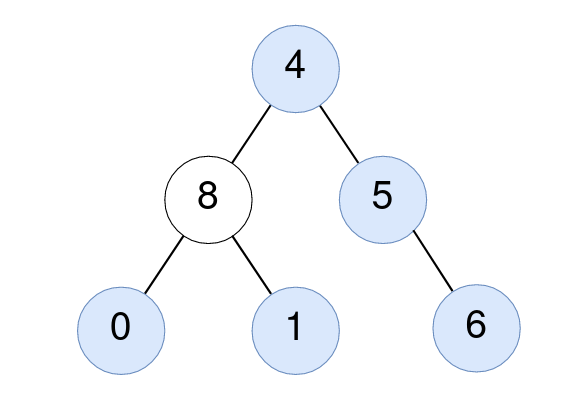| comments | difficulty | edit_url | rating | source | tags | |||
|---|---|---|---|---|---|---|---|---|
true |
Medium |
1472 |
Weekly Contest 292 Q2 |
|
Given the root of a binary tree, return the number of nodes where the value of the node is equal to the average of the values in its subtree.
Note:
- The average of
nelements is the sum of thenelements divided bynand rounded down to the nearest integer. - A subtree of
rootis a tree consisting ofrootand all of its descendants.
Example 1:
Input: root = [4,8,5,0,1,null,6] Output: 5 Explanation: For the node with value 4: The average of its subtree is (4 + 8 + 5 + 0 + 1 + 6) / 6 = 24 / 6 = 4. For the node with value 5: The average of its subtree is (5 + 6) / 2 = 11 / 2 = 5. For the node with value 0: The average of its subtree is 0 / 1 = 0. For the node with value 1: The average of its subtree is 1 / 1 = 1. For the node with value 6: The average of its subtree is 6 / 1 = 6.
Example 2:
Input: root = [1] Output: 1 Explanation: For the node with value 1: The average of its subtree is 1 / 1 = 1.
Constraints:
- The number of nodes in the tree is in the range
[1, 1000]. 0 <= Node.val <= 1000
We design a function
The execution process of the function
- If the current node is null, return
$(0, 0)$ . - Otherwise, we recursively calculate the sum and the number of nodes of the left and right subtrees, denoted as
$(\textit{ls}, \textit{ln})$ and$(\textit{rs}, \textit{rn})$ , respectively. Then, the sum$\textit{s}$ and the number of nodes$\textit{n}$ of the subtree rooted at the current node are$\textit{ls} + \textit{rs} + \textit{root.val}$ and$\textit{ln} + \textit{rn} + 1$ , respectively. If$\textit{s} / \textit{n} = \textit{root.val}$ , it means the current node meets the requirement of the problem, and we increment the answer$\textit{ans}$ by$1$ . - Finally, the function
$\textit{dfs}$ returns$\textit{s}$ and$\textit{n}$ .
We initialize the answer
The time complexity is
class Solution:
def averageOfSubtree(self, root: TreeNode) -> int:
def dfs(root) -> tuple:
if not root:
return 0, 0
ls, ln = dfs(root.left)
rs, rn = dfs(root.right)
s = ls + rs + root.val
n = ln + rn + 1
nonlocal ans
ans += int(s // n == root.val)
return s, n
ans = 0
dfs(root)
return ans/**
* Definition for a binary tree node.
* public class TreeNode {
* int val;
* TreeNode left;
* TreeNode right;
* TreeNode() {}
* TreeNode(int val) { this.val = val; }
* TreeNode(int val, TreeNode left, TreeNode right) {
* this.val = val;
* this.left = left;
* this.right = right;
* }
* }
*/
class Solution {
private int ans;
public int averageOfSubtree(TreeNode root) {
dfs(root);
return ans;
}
private int[] dfs(TreeNode root) {
if (root == null) {
return new int[2];
}
var l = dfs(root.left);
var r = dfs(root.right);
int s = l[0] + r[0] + root.val;
int n = l[1] + r[1] + 1;
if (s / n == root.val) {
++ans;
}
return new int[] {s, n};
}
}/**
* Definition for a binary tree node.
* struct TreeNode {
* int val;
* TreeNode *left;
* TreeNode *right;
* TreeNode() : val(0), left(nullptr), right(nullptr) {}
* TreeNode(int x) : val(x), left(nullptr), right(nullptr) {}
* TreeNode(int x, TreeNode *left, TreeNode *right) : val(x), left(left), right(right) {}
* };
*/
class Solution {
public:
int averageOfSubtree(TreeNode* root) {
int ans = 0;
auto dfs = [&](auto&& dfs, TreeNode* root) -> pair<int, int> {
if (!root) {
return {0, 0};
}
auto [ls, ln] = dfs(dfs, root->left);
auto [rs, rn] = dfs(dfs, root->right);
int s = ls + rs + root->val;
int n = ln + rn + 1;
if (s / n == root->val) {
++ans;
}
return {s, n};
};
dfs(dfs, root);
return ans;
}
};/**
* Definition for a binary tree node.
* type TreeNode struct {
* Val int
* Left *TreeNode
* Right *TreeNode
* }
*/
func averageOfSubtree(root *TreeNode) (ans int) {
var dfs func(root *TreeNode) (int, int)
dfs = func(root *TreeNode) (int, int) {
if root == nil {
return 0, 0
}
ls, ln := dfs(root.Left)
rs, rn := dfs(root.Right)
s, n := ls+rs+root.Val, ln+rn+1
if s/n == root.Val {
ans++
}
return s, n
}
dfs(root)
return
}/**
* Definition for a binary tree node.
* class TreeNode {
* val: number
* left: TreeNode | null
* right: TreeNode | null
* constructor(val?: number, left?: TreeNode | null, right?: TreeNode | null) {
* this.val = (val===undefined ? 0 : val)
* this.left = (left===undefined ? null : left)
* this.right = (right===undefined ? null : right)
* }
* }
*/
function averageOfSubtree(root: TreeNode | null): number {
let ans: number = 0;
const dfs = (root: TreeNode | null): [number, number] => {
if (!root) {
return [0, 0];
}
const [ls, ln] = dfs(root.left);
const [rs, rn] = dfs(root.right);
const s = ls + rs + root.val;
const n = ln + rn + 1;
if (Math.floor(s / n) === root.val) {
++ans;
}
return [s, n];
};
dfs(root);
return ans;
}
